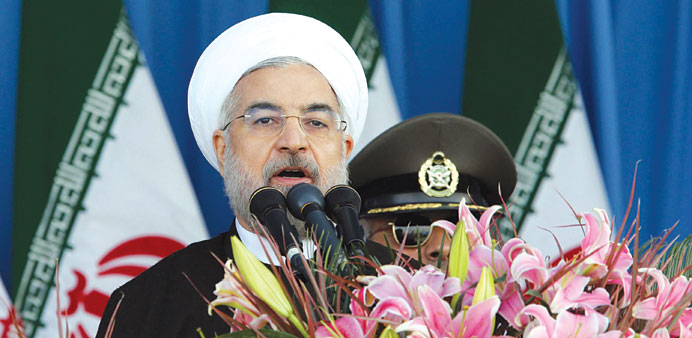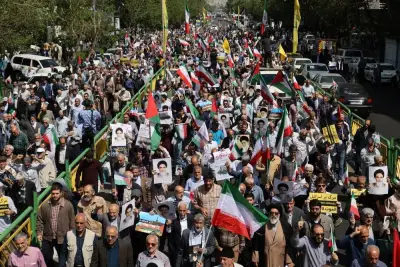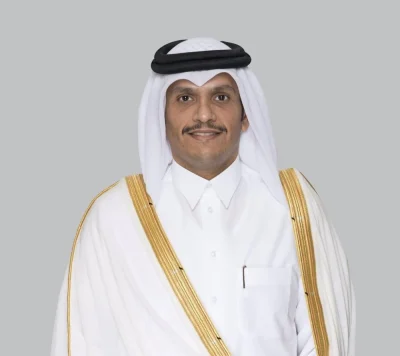Agencies
Iranian President Hassan Rohani said the Islamic Republic had the might to deter any attacks as its military displayed a range of drones and missiles at an annual parade in Tehran, state television reported yesterday.
Chanting “God is Greatest,” troops paraded missiles carriers, some bearing banners saying “Death to America” and “Death to Israel”, armoured personnel carriers and unmanned surveillance aircraft as well as small submarines with men wearing aqua-lungs alongside.
Unlike hardline predecessor Mahmoud Ahmadinejad, Rohani did not use his speech to lash out at the US and Israel, which Tehran refuses to recognise.
“We told the world during the (nuclear) talks and we repeat that we don’t support any aggression ... We support dialogue,” Rohani said in the live broadcast.
“We don’t attack any country and don’t want war but we will firmly confront any aggression against Iran,” he said, as helicopters and fighter jets flew overhead and parachutists landed in the parade area in the south of the capital near the shrine of revolutionary leader Ayatollah Khomeini.
Rohani’s tone contrasted sharply with the often bellicose rhetoric of Ahmadinejad, who routinely took aim at Israel.
“We are people of reason and dialogue,” he said.
“Over the past two centuries Iran has never attacked anyone, but we have always confronted aggressors.”
Rohani delivered his comments a day after the United States said it was unfreezing $450mn of Iranian funds in acknowledgement that Iran was honouring its commitments to gear down its nuclear programme.
The US acted in response to a report issued on Thursday by the International Atomic Energy Agency in Vienna that said Iran has now either diluted or chemically converted three-quarters of its stock of about 200kg of uranium enriched to 20%. Enriched uranium can be used to produce nuclear weapons.
Rohani described his team at the nuclear negotiations as “officers of peace”.
The aim of the team’s mission, he said, was to make known Iran’s peaceful intentions to the international community as well as to stand up for the country’s legitimate interests.
Since coming to power last August, Rohani, seen as a moderate determined to revive Iran’s sanctions-ravaged economy, has presided over a delicate thaw in relations with the West.
Under a preliminary deal signed last November, Iran agreed to freeze some nuclear activities for six months, which led to modest sanctions relief and a promise from Western states of no new restrictions on its hard-hit economy.
Iran’s talks with the P5 +1 powers - the United States, Russia, China, Britain, France and Germany - will resume on May 13, with leaders seeking a lasting accord to end a long-running international standoff over the country’s nuclear activities.
Iran has always denied allegations by Western nations and Israel that it is secretly pursuing a nuclear weapons capability alongside its civilian programme.



